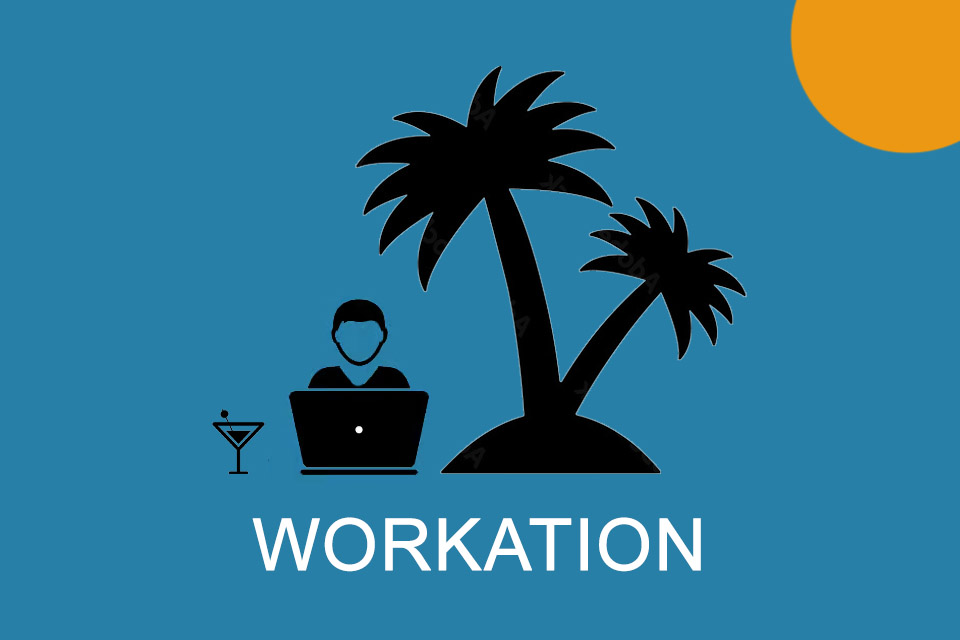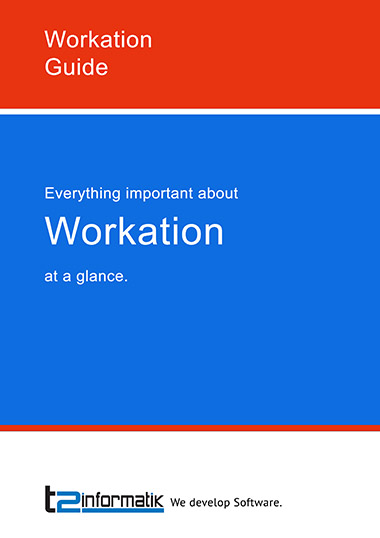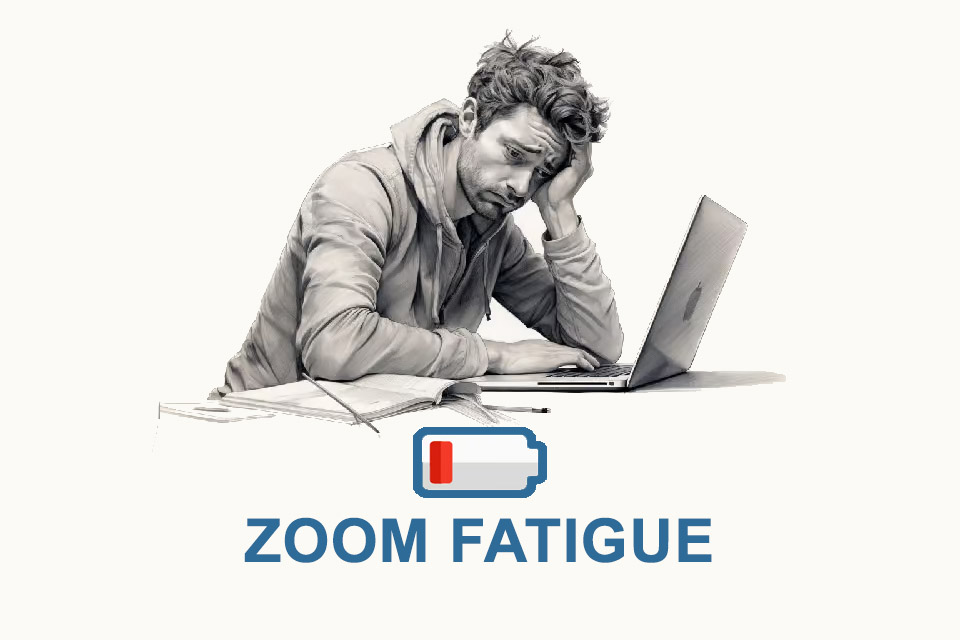What is a Workation?
Table of Contents: Definition – Organisation – Prerequisites – Advantages and disadvantages – Questions from the field – Download – Notes
Smartpedia: A workation combines working (Work) and taking a holiday (Vacation). It is a concept for travelling workers or working travellers.
Workation – work and vacation combined
Workation is a portmanteau of the two terms “work” and “vacation”. And that is exactly what it is about: the combination of work and vacation. It is a concept for travelling workers or working travellers.
At first glance, the two terms contradict each other, because those who work do not take a holiday, and those who take a holiday do not work. At second glance, however, this has not been true for many workers for a very long time: they read and answer emails on vacation, take part in video conferences in hotel rooms or compare offers from suppliers between breakfast on the hotel veranda and a walk to the beach. In contrast to such situations, workation goes a significant step further: work and vacation take place in combination. Consciously. Planned. And with clear, open communication between the parties involved – e.g. employee and employer or contractor and client.
How can workations be organised?
A workation can be organised individually – and ideally in consultation with the employer or client. It would be conceivable, for example, to work the usual agreed time – e.g. 8 working hours per day – during normal office hours in order to then enjoy the benefits of the “holiday location”. The number of normal working hours could also be reduced in order to use more time for “holiday activities”. Alternating between “normal” work and holidays on a weekly basis or one week of “normal” working hours, two weeks of holidays and another week of “normal” working hours would also be conceivable.
In short: if the parties involved can agree on a workation model, there are no limits to the imagination.
Prerequisites for a workation
Even though there is often little difference between working in a company office and a home office, there can be major differences between work and vacation. Here are some exemplary prerequisites for a workation:
- The work and holiday location should in most cases be in the same time zone as the company back home.
- An “acceptable” connection to the internet on site and, if necessary, when travelling between locations must be guaranteed.
- “Suitable” work equipment must be available on site. A graphic designer who is used to working with a 4K monitor will probably struggle with a small laptop in the long run. Someone who usually plots plans is unlikely to find the necessary equipment in an internet café, etc.
- The insurance cover of the travelling employee or the working traveller should be clearly clarified and regulated. Depending on the place of work and holiday, overseas health insurance should also be in place.
- Possible recommendations or warnings from the Federal Foreign Office should be checked before the start of the journey.
- Ideally, means of communication and payment should also work when travelling abroad.
These points are probably nothing new for holidaymakers and long-distance travellers. Nevertheless, workationers (and sometimes also the companies involved) should consider these and similar aspects before such work trips.
Advantages and disadvantages of a workation
A workstation offers advantages, but may also have some disadvantages. And this is true for employees, contractors, solo self-employed as well as for employers or clients. Here is a list of exemplary advantages:
- Travelling broadens personal horizons. It is fun and gives pleasure. The “normal working day” recedes into the background. Relaxation sets in. Interest in new things is awakened. Energy is generated by new impressions and stimuli. The senses are sharpened. Motivation increases. Ideas come to light. Creativity flows. And often observations made at the place of travel can be directly transferred to the professional world.
- The exchange with others is promoted through joint co-working. The fresh view from outside, which is otherwise often missing in day-to-day business, opens up other perspectives. At the same time, new contacts can be made and the network expanded.
- In addition to the individual freedom of the individual, teams could also travel together for work and vacation. This promotes team building, strengthens the sense of togetherness, provides impulses for joint projects and creates an almost unbeatable team spirit.
- Companies that see workation as an opportunity may also find it easier to recruit new employees.
And here is a list of possible disadvantages:
- Not every employee likes the mixing of work and pleasure. Not everyone has the openness to try something new. So for employees for whom a fixed structure is particularly important, for whom flexibility is comparatively somewhat less important, it may not be a desirable working model.
- Similar to the home office, work and leave usually does not work indefinitely. The personal exchange with team colleagues, the informal conversation in the coffee kitchen, the dialogue about ideas, fears and concerns, the communication about wishes and expectations is missing in the long run.
- Communication between those involved is usually slower than on-site communication. Simply knocking in the neighbouring office or calling out information to a colleague in the open-plan office does not work. Of course, telephone calls can be made synchronously and e-mails can be sent asynchronously, but on the one hand the perceived effort is comparatively high, and on the other hand the lack of facial expressions and gestures makes it difficult to discuss the content.
- Lack of clarity makes collaboration difficult. When exactly does the workationer work today? When can I expect an answer? Why haven’t I received any feedback yet? The more unclear individual aspects of cooperation are, the less colleagues, superiors or clients perceive work and vacation as a benefit.
Which advantages or disadvantages there are in a specific case and whether the advantages outweigh possible disadvantages should be assessed by organisations on a case-by-case basis.
Questions from the field
Here you will find some questions and answers from the field:
Which jobs are suitable for workstations?
For a long time, it was seemingly reserved for digital nomads, freelancers, solo freelancers, etc. to combine the pleasant with the useful and to work in beautiful locations and thus from “anywhere”. With the increasing digitalisation of work processes in organisations and the possibilities of working from home, workation is also an option for many employees. It often makes little or no difference whether a
- software developer,
- marketing employee,
- project employee,
- podcaster,
- accountant,
- requirements analyst,
- business coach
- …
working from home 10 kilometres from the company’s headquarters or 2,500 kilometres away on a beautiful island (see requirements for Workation).
The list is certainly easy to extend, but it is not endless. Some job profiles do not favour working in distant countries: a police officer, a firefighter, a petrol station attendant or a nurse cannot work in other locations. However, it is conceivable that such professions will also be able to take advantage of the benefits of working remotely in the future if they only carry out part of their work elsewhere: Administrative activities, further training and online consultations can also be carried out at other locations.
What tips are there for carrying out a workation?
There are some tips for carrying out a workation:
- Clarify the expectations with your employer or client. For example, if the client expects a response time of 15 minutes to an email, this may have an impact on the model of the workation. What happens in the case of additional or short-term tasks? How important is availability during “normal” business hours?
- Consider the possible impact on colleagues or employees. For example, how important is an on-site presence, how do you communicate with each other and how quickly do you have to travel from one location to another? What demands on your role in the company may be difficult to fulfil and who will temporarily take over some of your activities?
- Work in the corporate office is often geared towards efficiency. There are departmental printers, scanners, height-adjustable desks, large monitors, etc. In a home office, the equipment is often a little less “luxurious”. It is therefore important to clarify the available work equipment in advance. The less equipment you have and the more you need, the more you may have to compromise on efficiency.
- A major weakness of “work and travel” is often the lack of internet access. Access to the internet is also essential for a workation. If you work with large amounts of data, you will want to use a fast WiFi. Here it is advisable not only to trust the information provided by hotels, hostels & co. but also to take a look at reviews and consider them when choosing accommodation or a co-working place.
- Few people like to work by the pool for eight hours at 30 degrees in the shade. Although this looks great in photos, an air-conditioned workspace should still be available when the outside temperatures are appropriate. And those who are travelling together with several people are probably also happy to have several places to retreat.
- Working on site is different from working in a usual office or home office and requires a special discipline. Here it can be useful to set focus times or use timeboxing.
- Every now and then you can read that companies should offer workations as an incentive and thus as a reward for successful work. Companies can do this, of course, but it does not have to go down well with everyone. It would be better to offer the combination of work and leave to employees, provided it fits in terms of content and organisation. Communication with those for whom it does not fit in terms of content and organisation then becomes particularly important. Clear and open communication is the basis for continued trustful cooperation between all employees.
- Last but not least, it can make sense to first try out a trip to a closer location, which tends to be shorter. At first glance, working in a different location sounds tempting for many people, but not everyone actually finds it easy. Increasing experience and positive insights then lead almost automatically to trips to more distant places and countries.
How do employees perceive their colleagues' workstations?
- Some employees may be envious because they wish they also had the opportunity to work from a different location and enjoy the surroundings at the same time. However, this opportunity may not be available for family or work-related reasons.
- Others may admire the colleague who has taken the initiative to do a workation and see him or her as innovative and courageous.
- Some employees may be sceptical and wonder whether work efficiency is actually guaranteed during a workation or whether the person is simply taking a holiday. There may also be concerns that extra work will be required as the travelling colleague will no longer be able to carry out all tasks as usual.
- There are employees who may be curious and want to learn more about how a workation works and may be inspired to try it out for themselves.
- There is also the possibility that some employees may feel that those who do a Workation are privileged or favoured. This can lead to resentment, especially if line managers take advantage of the opportunity.
- And there are employees who may not care much about where their colleagues work as long as the work gets done and communication is smooth.
Because perceptions and attitudes vary, it’s important for organisations to be transparent and set policies that ensure workspaces are fair and equitable for all employees while promoting productivity and collaboration. It can also be helpful to have open discussions about work from other locations to clarify misunderstandings and promote understanding and acceptance within the team.
Are there any providers who can help with the planning?
There are a number of organisations such as TUI Magic Life, FutureWork Innovations, The Workation Village and SurfOffice, that have corresponding offers in their range.
The number of offers is likely to increase significantly over the next few years.
What is the difference between work & travel and workation?
Although both concepts involve working in remote locations, there is a key difference between work & travel and workation:
Work & Travel is a concept often used by young people to earn money while travelling. It typically involves longer stays abroad, during which the person works – for example as a waiter, harvest worker or seasonal labourer – to cover their travel expenses. Travelling is therefore the main focus, working is a means to an end.
A workation, on the other hand, is a mixture of work and holiday at a remote location. In a workation, employees take their work with them while they are at another location, be it in another country or simply at a remote location within the same country. The purpose of a workation is to enjoy a change of environment, find new inspiration and work productively at the same time. In contrast to work & travel, the focus is not on travelling, as the trip serves more as a supplement to the working environment, for example to promote creativity and improve morale.
The term “good internet connection” offers a lot of room for interpretation in a workation. How can you clarify the quality or performance of the internet connection in advance?
Notes:
If you like the article or would like to discuss it, please feel free to share it in your network. And if you have any comments, please do not hesitate to send us a message.
Here you will find an overview of the legal aspects of a workation (in German).
And here you will find additional information from our Smartpedia section:




